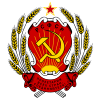- Nikolay Shvernik
-
Nikolay Shvernik
Николай Шверник
Chairman of the Presidium of the Supreme Soviet of the Soviet Union In office
19 March 1946 – 15 March 1953General Secretary Joseph Stalin Preceded by Mikhail Kalinin Succeeded by Kliment Voroshilov Chairman of the Presidium of the Supreme Soviet of the Russian SFSR In office
4 March 1944 – 25 June 1946Chairman of
the PresidiumMikhail Kalinin Preceded by Ivan Vlasov Succeeded by Ivan Vlasov Personal details Born 7 May 1888
St. Petersburg, Russian EmpireDied 24 December 1970 (aged 82)
Moscow, Russian SFSR, Soviet UnionNationality Soviet Political party Communist Party of the Soviet Union Spouse(s) Mariya Fedorovna Ulazovskaya Nikolay Mikhailovich Shvernik (Russian: Никола́й Миха́йлович Шве́рник, 19 May [O.S. 7 May] 1888 – 24 December 1970) was a Russian politician, who was the Chairman of the Presidium of the Supreme Soviet of the USSR (or President of the USSR) from March 19, 1946 until March 15, 1953. Though the titular head of state Shvernik, in fact, had little power as the real authority lay with Joseph Stalin as General Secretary of the Communist Party.
Biography
Shvernik was born in St. Petersburg.
Shvernik joined the Bolsheviks in 1905. In 1924 he became a People's Commissar in the Russian Soviet Federative Socialist Republic and became a full member of the Central Committee of the party in 1925. In 1927 he was demoted and sent to the Urals to head the local party organization. Stalin found him a loyal supporter of his policy of rapid industrialisation and moved him back to Moscow in 1929 making him chairman of the Metallurgist Trade Union. He resumed his rise in the party becoming a member of the Orgburo and the party Secretariat. He also served as first secretary of the All-Union Central Council of Trade Unions from July 1930 to March 1944.
During the Second World War Shvernik was responsible for evacuating Soviet industry away from the advancing Wehrmacht. He was Chairman of the Presidium of the Supreme Soviet of the Russian SFSR 1943 - 1946. In 1946 he became Chairman of the Presidium of the Supreme Soviet of the USSR succeeding Mikhail Kalinin. He only became a member of the Politburo of the CPSU Central Committee (then named the Presidium of the Party's Central Committee) in 1952 but was demoted in 1953 when the body was reduced in size.
Following the death of Stalin, Shvernik was removed as titular president of the USSR and replaced by Kliment Voroshilov on March 15, 1953. Shvernik returned to his work as the chairman of the All-Union Central Council of Trade Unions. In 1956, after his work in the Pospelov Commission, which was the basis of Khrushchev's "Secret Speech" denouncing Stalinism, Khrushchev recommended Shvernik for the post of chairman of the Party Control Committee and later put him in charge of rehabilitating the victims of Stalin's purges (Shvernik Commission). In 1957, Shvernik again became a full member of the Presidium and remained on the body until he retired in 1966.
Political offices Preceded by
Mikhail KalininChairman of the Presidium of the Supreme Soviet
1946–1953Succeeded by
Kliment VoroshilovHeads of state of the Soviet Union Heads of state Vice heads of state Acting heads of state  Heads of state of the Russian SFSR
Heads of state of the Russian SFSRHeads of state 
Vice Presidents Rutskoy (1991)Acting heads of state Categories:- 1888 births
- 1970 deaths
- Bolsheviks
- Central Committee of the Communist Party of the Soviet Union members
- Heads of state of the Soviet Union
- Heroes of Socialist Labour
- Old Bolsheviks
- People buried in the Kremlin Wall Necropolis
- People from Saint Petersburg
- Politburo of the Central Committee of the Communist Party of the Soviet Union members
- Russian Social Democratic Labour Party members
- Russian revolutionaries
- Soviet people of World War II
Wikimedia Foundation. 2010.
